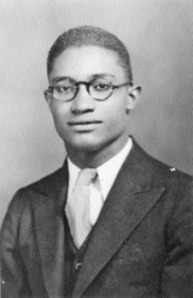Lawrence Reddick was a Ph.D. from the University of Chicago who conducted path-breaking research on the attitudinal effects of African-American stereotyping in various media including textbooks, television, literature, and film.

His study of the American history textbooks of sixteen Southern states in 1934 concluded that, through a combination of misrepresentation and omission, the typical Southern textbook portrayed African Americans overwhelmingly negatively, depicting them as docile and content in slavery, and unruly and unworthy of freedom following the Civil War. He also critiqued the prevailing mindset of historians of black history, who valorized submissive and accommodating attitudes and behavior by blacks.
As head curator of the Schomburg Collection of Negro Literature at the New York Public Library from 1938 to 1948, Reddick oversaw the compilation and preservation of materials related to black life. He also wrote and spoke extensively about race relations in American, especially as they were impacted by negative stereotypes.
In the 1950s and 1960s, Reddick worked with Martin Luther King, Jr. on the Southern Christian Leadership Council (SCLC), traveling with him to India in 1959, and to Oslo in 1964 for the Nobel Prize ceremony. In 1959, he published the first biography of King, Crusader Without Violence: A Biography of Martin Luther King, Jr.
Reddick was also the author of Our Cause Speeds On (1957), and a co-author of The Southerner as American (1960) and Worth Fighting For: The History of the Negro in the United States During the Civil War and Reconstruction (1965).
Reddick held academic positions at various universities, including Temple University, City College, the New School for Social Research, and Harvard University, where he was a visiting professor in the African American Studies Department during the 1977-1978 academic year. He taught Afro-American history at Dillard University in New Orleans from 1978 to 1987, when he retired. He died in 1995.
Filed under: History | Tagged: Black History, History |




Leave a comment